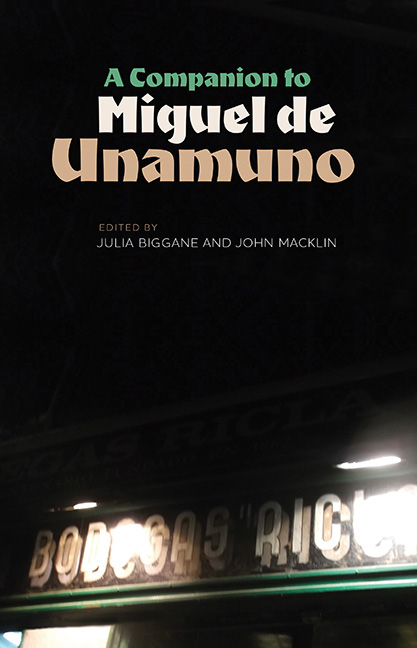2 - Writing Vital Struggle: Unamuno’s Narrative Fiction 1902–1923
Published online by Cambridge University Press: 21 May 2021
Summary
This chapter traces the changes in Unamuno's narrative after the appearance of his first published novel, Paz en la guerra, until shortly before he was sent into exile. It deals, then, with much of the mature fiction for which Unamuno has become best known in Spain and beyond, and covers a period in which the evolving effects of a recent major turn in Unamuno's personal, intellectual and political preoccupations were played out in his literary and essayistic production. The chapter examines the two heavily metafictional, experimental novels Amor y pedagogía (1902) and Niebla (1914); the starker and structurally simpler novels Abel Sánchez (1917) and La tía Tula (1921), and the shorter texts (Nada menos que todo un hombre, El marqués de Lumbría and Tulio Montalbán y Julio Macedo), originally published in popular novella collections, with the first two republished, along with a new text, Dos madres, in the 1920 volume Tres novelas ejemplares y un prólogo. This volume contains an important critique of realism in fiction and provides an explanation of Unamuno's narrative practices throughout the period under study, so deserves careful examination. As La tía Tula is discussed in some detail in the chapter on gender and sexuality, and elsewhere in this volume, its treatment here is relatively brief. The present chapter will also discuss the major 1912 essay Del sentimiento trágico de la vida en los hombres y los pueblos. This text explored a fundamental question for Unamuno: if, as Spinoza had proposed, our essence as living beings is distinguished by the will to persist indefinitely in our being, how do we live—and how should we live—if we cannot know whether our hunger for immortality will be satisfied? Engagement with this question informed all Unamuno's post-1897 thought, and an appreciation of it is essential for an understanding of his literary texts.
As the above summary implies, the chapter will concentrate on explaining the philosophy guiding Unamuno's narrative production over the period: without an understanding of his thought at this time, his fiction can seem strange, at times schematic, and difficult to contextualise. Narrative form and technique are discussed in detail insofar as they embody Unamuno's central ideas.
- Type
- Chapter
- Information
- A Companion to Miguel de Unamuno , pp. 29 - 52Publisher: Boydell & BrewerPrint publication year: 2016



